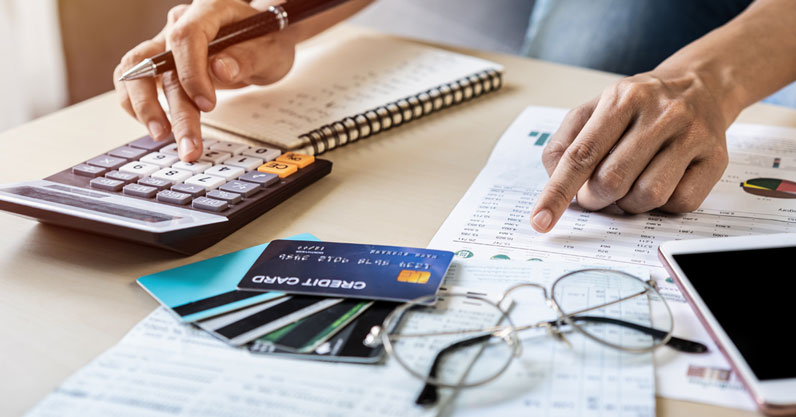4 Smart Ways To Use Your Credit Card During A Crisis
4 min readThe current COVID-19 pandemic can be damaging not only to your health but your credit card bill, too, if you’re not careful.

During these times of uncertainty, your credit card can be your best friend, especially with cashless transactions becoming increasingly popular.
To make sure that your finances survive this crisis, here are some tips to wisely utilize your card all throughout the quarantine period.
Swipe whatever expense you can
Before you start charging stuff to your card, let’s talk about ground rules first.
Right now, chances are your source of income is at risk due to the economic effects of the coronavirus. This means that you have to preserve your cash reserves as much as possible for traditional transactions.
If you have an active credit card now, this is the perfect time to make it the star of your finances.
However, make sure you limit your credit card expenses to the following essentials:
- Grocery shopping
- Utility payment
- Hospital expenses
Why charge them using your card?
First, this will ensure that whatever cash on hand you have will be reserved for more urgent expenses as well as emergency funds. You will need your cash reserves when things take a turn for the worse, like when payment networks go offline.
Finally, more charges to your credit card mean more points you can get. Whatever credit card you’re using, you can keep on accumulating points through regular transactions.
You can use these points to buy more essentials (depending on your credit card’s point exchange system).
Put simply, charge all recurring and necessary expenses to your credit card and leave your cash alone.
(Read: ‘Payment Holiday’ On Your Loan And Credit Card Explained)
Kill the subscriptions
Thanks to the likes of Spotify, Netflix, and other paid subscriptions you have, you can go through the quarantine period by being distracted and not getting crippling anxiety all the time. However, we would recommend you to cancel all your subscriptions linked to your card for now.
Now, how will you live without watching Crash Landing on You or seeing how Money Heist ends? Fortunately, you don’t have to stop your subscriptions entirely.
Instead, you can remove your credit card from your accounts and use another payment method like your debit card or mobile wallet.
Why are we recommending this? If you have the most basic subs, Netflix’s most expensive plan will cost you P549 and Spotify will charge you P194 for the family plan. Remove both of them from your credit card bill and you get extra P743 that can be used for important expenses.
Freeing up your account from these expenses will mean you won’t max out your card easily. The more subscriptions you remove from your credit card, the bigger the gap becomes between your expenses and your credit limit.
Extreme frugality dictates that you cut these expenses now during COVID-19 season, but the last thing we want is you going postal because you didn’t get your Riverdale fix.
Use the grace period
We’ve talked about credit card float in the past and how you can maximize your grace period for interest-free charges. Now more than ever, you need to take advantage of this.
In case you missed it, credit card float is simply the interest-free period between the end of your currently billing cycle and the deadline for payment on your next month’s bill. This gives you up to 45 days of interest-free charges.
How can you take advantage of it during turbulent financial times? For starters, you need to know about both your billing cycle period and due dates, which are usually fixed dates every month.
Once you’ve figured it out, make the biggest purchase you need to do one day after your current billing cycle. This means big trips to the groceries, multiple shopping cards, bills payment, and others.
Stock up on goods and buy all the essentials. Maximize that one day so you don’t have to repeatedly go out of your house and risk getting sick.
Since you purchased it one day after your current billing cycle, your card issuer will bill you for those expenses after your upcoming payment cycle. This gives you a good headstart to put your finances in order and ensure that you have stability for the next few weeks.
Despite the grace period, don’t forget that you have to pay your bills on time and in full to be able to enjoy it again!
(Read: Grocery Shopping Tips During COVID-19)
Be mindful of your card’s payment holiday
As a gesture of solidarity with Filipinos, most banks have pushed their payment deadlines for another 30 days. It sounds like good news, right? However, make sure you’ve read the fine print or risk getting slapped with interests.
The so-called payment holiday, if you read the fine print, has two tricky components: only late fees are waived and it only applies to eligible customers. We talked about this in a separate article.
However, it all boils down to this: Call your bank as soon as possible so you can ask if you make it through the cut. This way, you know if you can take advantage of the payment holiday for longer credit card float for your account.
If you’re not eligible for payment extension, don’t fret. Just do your best to keep up with your payments and don’t do any unnecessary charges to your card.
